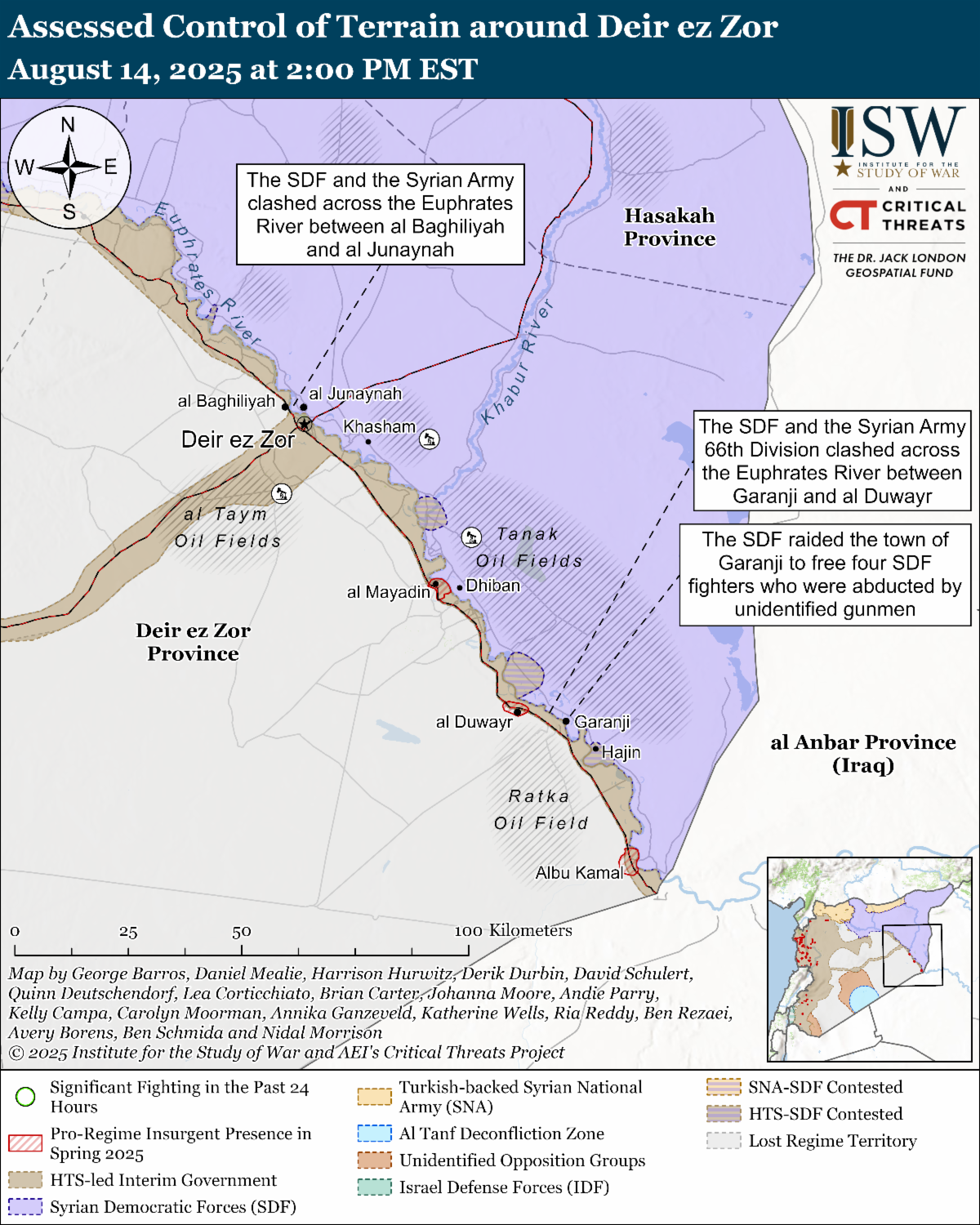Iranian Supreme Leader Ali Khamenei has reportedly approved the resumption of nuclear negotiations with the United States because the Iranian regime views negotiations as necessary for the regime’s survival, according to three Iranian insiders speaking to Reuters on August 14. One source stated that Iranian leaders support negotiations because they have “seen the cost of military confrontation“ and seek to prevent further escalation with Israel and the United States. Moderate and pragmatic officials in the regime have recently signaled openness to resuming negotiations. Moderate Iranian President Masoud Pezeshkian, for example, stated on August 10 that resuming negotiations with the United States ”does not mean we intend to surrender.” The Iranian regime continues to reject the US demand for Iran to halt uranium enrichment, which was the main sticking point in negotiations before the Israel-Iran War. Iranian Deputy Foreign Affairs Minister for Political Affairs Majid Takht Ravanchi recently told Japanese media on August 11 that Iran could agree to limit its uranium enrichment levels but will not agree to halt enrichment altogether.
A senior Iranian official told The Telegraph on August 13 that Iran would not be able to “endure” the reimposition of UN Security Council sanctions on Iran if the E3 (the United Kingdom, France, and Germany) triggers the snapback mechanism. Iran’s concern about potential snapback sanctions could push Iran to resume negotiations with the United States, although it is very unlikely that Iran would accept a new nuclear agreement with the United States that requires it to halt uranium enrichment on Iranian soil. The Telegraph report comes after the E3 warned on August 13 that it would trigger the snapback mechanism unless Iran shows a commitment to negotiations before August 31. The E3 has offered to postpone the expiration of the snapback mechanism, which is currently set to expire in October 2025, in order to provide Iran more time to negotiate with the United States. The senior Iranian official also told The Telegraph that the Iranian Supreme National Security Council (SNSC) instructed the Iranian Foreign Affairs Ministry in July to revive negotiations with the United States. The official added that the SNSC asked the Iranian presidential office at an unspecified time to pursue nuclear negotiations with the United States before the window for talks closes. It is unclear if the SNSC contacted the presidential office before or after President Masoud Pezeshkian appointed pragmatic hardliner Ali Larijani as SNSC secretary on August 5. Larijani has historically supported negotiations and could accelerate the SNSC’s push for negotiations with the United States. Larijani supported the 2015 nuclear deal, also known as the Joint Comprehensive Plan of Action (JCPOA), and defended it against hardliners in parliament while he was parliament speaker in the mid-2010s.
Former Iranian President Hassan Rouhani called on the Iranian regime to implement reforms and make concessions to the Iranian people to increase popular support for the regime, strengthen societal resilience, and reduce tensions with the West. Rouhani argued on August 13 that “new circumstances,” including Iranian setbacks in the region and a perceived gap between the Iranian regime and people, encouraged Israel and the United States to attack Iran. Rouhani expressed support for reducing tensions and negotiating with the United States and expanding relations with European and neighboring countries. Rouhani called for the formation of strong political parties and implicitly criticized the Guardian Council for disqualifying electoral candidates. The Guardian Council is a 12-member regime body that is responsible for supervising elections, vetting candidates, and approving legislation. Rouhani stated that Iranian leaders must prioritize Iran over other countries and only provide support to other countries to the extent that the Iranian public approves. Rouhani was likely referring to public demands for the regime to focus on domestic issues rather than sending money and resources abroad, particularly to the Axis of Resistance. Rouhani also stressed that the Iranian armed forces must focus on their inherent duties and not intervene in the economy, propaganda, and domestic and foreign policy. Rouhani has previously criticized the involvement of the armed forces in the economy. | 




 [ISW] 러시아 공세 캠페인 평가, 2025년 8월 14일
[ISW] 러시아 공세 캠페인 평가, 2025년 8월 14일
 [국방부] 국방부장관, 미국 하원의원단 면담
[국방부] 국방부장관, 미국 하원의원단 면담